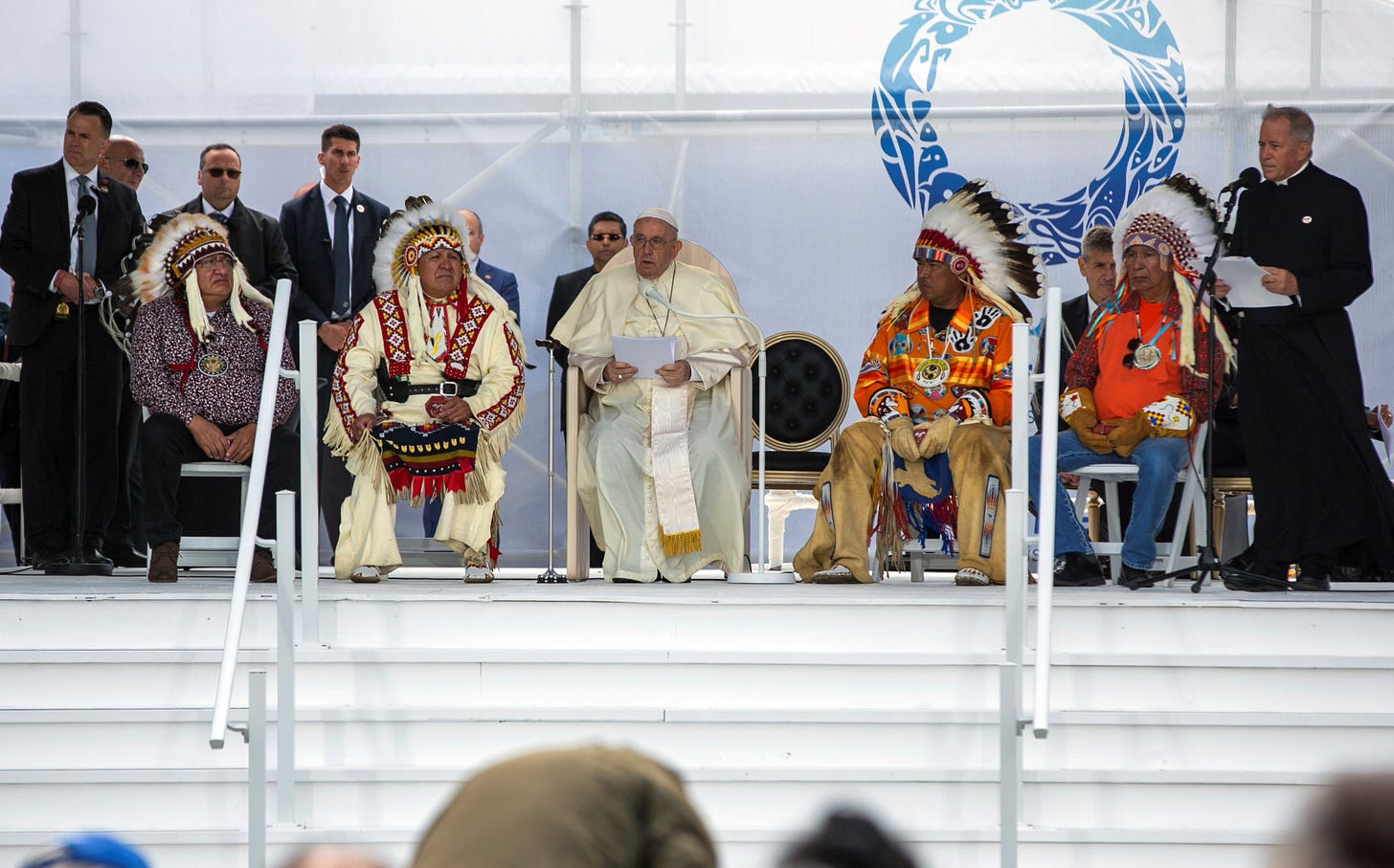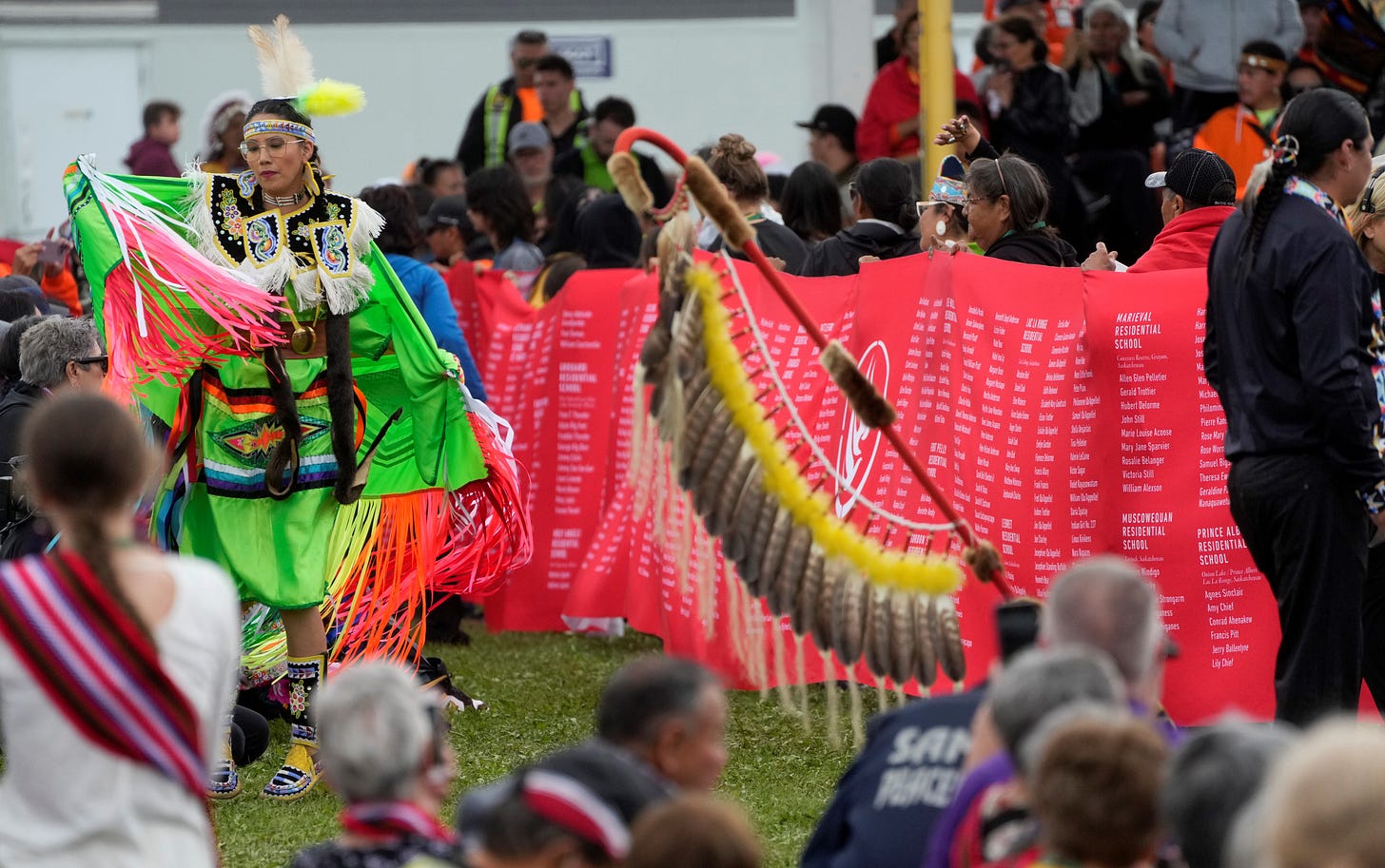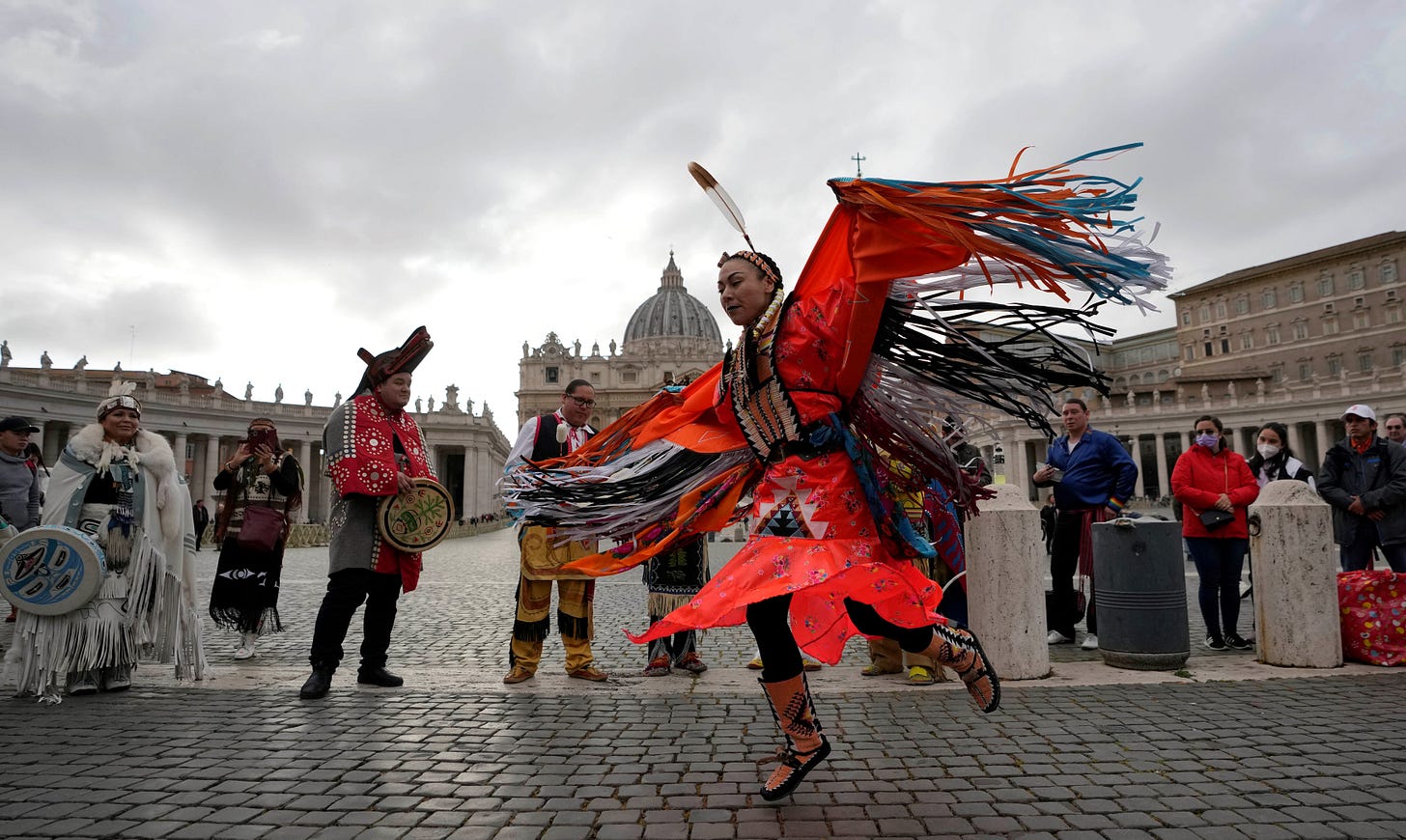Learning from the Pope’s Apology
“I am sorry.”
Pope Francis uttered those simple but powerful words Monday (July 25) at the start of what he called “a penitential pilgrimage” to Indigenous sites in Canada. His remarks came during a ceremony that included Indigenous performers beating drums, dancing, and singing. Dozens of people carried a 160-foot-long blood red banner with 2,800 names printed in white. The names are those of Indigenous children who died in Canada’s residential school system in the 19th and 20th centuries.
Francis listened to the testimony of an Indigenous survivor of a residential school. Then the pope spoke, honoring the Indigenous people and their land.
“These are lands that speak to us; they enable us to remember,” he said. “Brothers and sisters, you have lived on these lands for thousands of years, following ways of life that respect the Earth, which you received as a legacy from past generations and are keeping for those yet to come.”
But then Francis also said he must remember the “catastrophic” actions that came later, including by Catholic leaders. Earlier that morning, he visited graves — some marked, others not — at the nearby Ermineskin residential school, sitting quietly in his wheelchair under the rain as drummers paused while he prayed. At the ceremony a few hours later, he called for remembering such abuses.
“It is right to remember because forgetfulness leads to indifference, and as has been said [by Holocaust survivor Elie Wiesel], ‘The opposite of love is not hatred, it’s indifference. And the opposite of life is not death, it’s indifference.’ To remember the devastating experiences that took place in the residential schools hurts, angers, causes pain, and yet it is necessary,” Francis said. “I thank you for making me appreciate this, for telling me about the heavy burdens that you still bear, for sharing with me these bitter memories.”
And so, the pope apologized “for the ways in which, regrettably, many Christians supported the colonizing mentality of the powers that oppressed the Indigenous peoples.”
“With shame and unambiguously, I humbly beg forgiveness for the evil committed by so many Christians against the Indigenous peoples,” he said. “I ask forgiveness, in particular, for the ways in which many members of the church and of religious communities cooperated, not least through their indifference, in projects of cultural destruction and forced assimilation promoted by the governments of that time, which culminated in the system of residential schools.”

Francis continued to make additional stops in Canada this week at other residential school sites and places of importance to Indigenous communities. But the apology at the start — and the reason for his trip — rightfully received the most attention. So, in this issue of A Public Witness, we look at what led to this historic moment before reflecting on what it means to offer a corporate apology and what steps must come afterward.
Path to Apology
Like other western countries, Canada has an ugly history when it comes to the nation’s treatment of Indigenous peoples. Starting in the late 1800s and continuing until the 1990s, government policy forced many Indigenous children into residential schools that were run by a number of Christian denominations but predominantly by the Catholic Church (until the government took over the schools in 1969). The institutions became locations of terror, with students experiencing severe abuse, forced cultural assimilation, and even death. The nation continues to reckon with the trauma.
“When you leave a home that has structure, love, and empathy to go into an institution that has no love, no compassion, very cold, and in many cases physical, emotional, and sexual abuse to children, it has an impact that will stay with them for their entire life — as well as the lives of their children and grandchildren,” Angela White, executive director of the Indian Residential School Survivors Society, explained to Time.
Between 10,000 and 50,000 attendees never returned to their families, a group referred to as “the missing children.” Indigenous communities are finally getting grim answers to their decades-old questions as undocumented mass graves are being discovered on the grounds of the former schools. The Canadian government responded with financial commitments for additional search efforts, mental health support for survivors of the schools, and other initiatives.
While the recent discoveries of mass graves helped move Francis to apologize, the push for such action by the Catholic Church goes back much further. For instance, a legal settlement in 2008 led to the creation of a Truth and Reconciliation Commission to document what transpired at the schools.
The effort resulted in 94 “calls to action” designed to provide redress for the past, ensure a common remembering of the tragedies, and provide protections to Indigenous communities going forward. It specifically called “upon the pope to issue an apology to survivors, their families, and communities for the Roman Catholic Church’s role in the spiritual, cultural, emotional, physical, and sexual abuse of First Nations, Inuit, and Métis children in Catholic-run residential schools.”
Murray Sinclair, the commission’s chair, told the Canadian media outlet CBC, “We have concluded that cultural genocide is probably the best description of what went on here. But more importantly, if anybody tried to do this today, they would easily be subject to prosecution under the genocide convention.”

Despite all this, the Catholic Church still did not apologize. So, in March, a delegation of Indigenous leaders from Canada trekked to the Vatican to meet with Francis and urge him to travel to their land and apologize for the church’s role in running residential schools. As a symbol of their request, they gave him two pairs of moccasins to represent the children who didn’t come home from the schools. But Francis wasn’t supposed to keep these as gifts. He was to accept them with the understanding he would personally return them to Canada and apologize.
On Monday, Francis said he brought the moccasins with him, noting they have “kept alive my sense of sorrow, indignation, and shame.” He added his hope they could also point toward a “path to follow” since “we want to walk together, to pray together, and to work together, so that the sufferings of the past can lead to a future of justice, healing, and reconciliation.”
History of Apologies
While the Catholic Church didn’t apologize until this week, other Christian institutions have. The United Church of Canada apologized in 1986 for their complicity in the residential schools: “We tried to make you be like us and in so doing we helped to destroy the vision that made you what you were. As a result, you, and we, are poorer and the image of the Creator in us is twisted, blurred, and we are not what we are meant by God to be.” The denomination followed up with a second apology in 1998.
In 1993, Archbishop Michael Peers expressed contrition on behalf of the Anglican Church of Canada: “I accept and I confess before God and you, our failures in the residential schools. We failed you. We failed ourselves. We failed God. I am sorry, more than I can say, that we were part of a system which took you and your children from home and family.”
Similarly, the Presbyterian Church in Canada offered its own confession in 1994 that included: “In our cultural arrogance we have been blind to the ways in which our own understanding of the gospel has been culturally conditioned, and because of our insensitivity to Aboriginal cultures, we have demanded more of the Aboriginal people than the gospel requires, and have thus misrepresented Jesus Christ who loves all peoples with compassionate, suffering love that all may come to God through him. For the Church’s presumption we ask forgiveness.”
In these acknowledgments of human sin, Christians in Canada sought to model the mandates of their faith. Heinous things were done in Christ’s name, of which their institutions organized, led, and participated. Yet, their combined complicity was far less than that of the Catholic Church and their platform far smaller than the global pulpit enjoyed by the pope. The apology by Francis adds to their earlier witnesses for truth-telling and justice. But it also follows an understanding of corporate apology extending well beyond the topic of injustices committed against Indigenous peoples.

Pope John Paul II in many ways led the Catholic Church to embrace the idea of papal apologies, including for sins against women, Jews and other religious minorities, Aboriginal peoples in Australia and the Pacific, and victims of clergy sexual abuse. His successor, Pope Benedict XVI, also apologized for clergy sexual abuse but didn’t acknowledge the Vatican’s culpability. Francis apologized personally and for the church for clergy sexual abuse, as well as to Indigenous people in Bolivia in 2015 for wrongs committed by the church.
Other religious groups have also offered apologies for historic institutional sins. The Southern Baptist Convention, which was created to defend slavery, approved a resolution in 1995 declaring, “We apologize to all African-Americans for condoning and/or perpetuating individual and systemic racism in our lifetime; and we genuinely repent of racism of which we have been guilty, whether consciously (Psalm 19:13) or unconsciously (Leviticus 4:27).”
Two years later, the Dutch Reformed Church in South Africa offered an apology before the nation’s Truth and Reconciliation Commission for supporting apartheid. Many criticized it as not going far enough, and it didn’t since the denomination was facing internal pressures from hardliners who resisted apologizing at all.
And there have also been some apologies from Lutheran bodies, including the Evangelical Lutheran Church in America apologizing to Jews in 1993 for antisemitic writings of Martin Luther, the Lutheran World Federation apologizing in 2010 to Mennonites for persecuting 16th century Anabaptists, and the Evangelical Church in Germany apologizing in 2017 for its role in the genocide in Namibia at the start of the 20th century.
While these apologies were not all created equal, they each represented efforts to not merely acknowledge a past institutional wrong but also start the process of making amends. In doing so, these corporate apologies demonstrate a biblical concept often overlooked in individualistic societies.
Sorry Seems to Be the Hardest Word
Former President Donald Trump embodied one of the worst elements of our contemporary politics: the inability to admit a mistake (even to God). In our culture, apologies are assumed to reflect weakness. Acknowledging error creates openings for opponents, so “smart” leaders never apologize, no matter how obvious the mistake. In contrast to Trump and other politicians, Pope Francis reminds us that human error is inevitable, honesty about our mistakes is a virtue, and God’s mercy is a powerful reality that responds to the multitude of our sins.
Francis also serves as a witness to the need for corporate apology. While the mistakes of individuals are easy to condemn, we struggle with the idea of collective sin. Consider the anger over Critical Race Theory, whose core idea is that the racial injustices of the past continue to influence the present, or the way former President Barack Obama was attacked for his “apology tours” for simply daring to acknowledge our nation isn’t perfect.
Countries, churches, businesses, and other institutions are legal entities that continue to live even as generations pass. Assets remain, birthdays celebrated, and legacies honored. But that also means such corporate bodies can — and should — apologize and make amends for past sins, just as individuals would for their own personal failings. This idea of corporate sin and repentance occurs throughout the Bible. The horrors that occurred in Canada’s residential schools (and in similar schools in the United States) for Indigenous children resulted from the implementation of immoral government policy by corrupt religious institutions. This egregious example should caution us against blaming “a few bad apples” for social evil. An inability to see past individualistic explanations is a whole other form of collective sin that demands our recognition and repentance.
While Francis is modeling a better way than many public leaders, he’s received some criticism that’s worth noting as we seek to learn how churches and denominations can effectively address past injustices their institutions perpetrated. Murray Sinclair, who was chair of Canada’s Truth and Reconciliation Commission that urged the Catholic Church to apologize, called Francis’s words on Monday a “historic apology” but noted it still “left a deep hole in the acknowledgement of the full role of the church in the residential school system, by placing blame on individual members of the church.” He’s not wrong that Francis’s words could be read as blaming some Catholic individuals but not necessarily the Catholic Church itself.
Similarly, Mark Charles, author of Unsettling Truths: The Ongoing, Dehumanizing Legacy of the Doctrine of Discovery, said that while he does “appreciate and acknowledge Pope Francis’s sincerity,” he was “deeply disappointed” that the pope decided “to just apologize on behalf of people who did horrible things instead of acknowledging that these were the policies, these were the doctrines of the church, these were the actions of the church.”
As Charles noted, Francis didn’t repudiate or apologize for the “Doctrine of Discovery” articulated by 15th-century papal edicts that theologically set the stage to seize the lands of Indigenous peoples and kill, enslave, or forcibly assimilate those living there. Several Protestant denominations have repudiated the doctrine in recent years (including the Episcopal Church, Evangelical Lutheran Church in America, Presbyterian Church (USA), Quakers, and United Methodist Church). After Francis’s apology on Monday, some Indigenous leaders have called on him to now repudiate the Doctrine of Discovery of his predecessors.
Francis did explicitly admit the church’s behavior in his 2015 apology to Indigenous people in Bolivia as he noted “the offenses of the church herself.” That phrase was missing Monday. Christian leaders should follow the Bolivia example to apologize not merely personally for past institutional sins but clearly as the offending body.
Even with shortcomings in wording, the imagery of the pope’s visit this week will likely go a long way in helping some find healing. The trip, especially given Francis’ physical limitations, is perceived as an act of solidarity, reflecting a priority by the pontiff to be with those who have suffered and personally offer what healing he can.

Matthew Wildcat, a member of Ermineskin Cree Nation and a Canadian academic, wrote, “I found the apology deeply moving — not just to see and hear the words being spoken, but to witness the silence, the applause, the tears and, at times, a sense of triumph.” He added, “The apology represents a fundamental step required to give survivors of residential schools the dignity of knowing the head of the Catholic Church has admitted that the institution committed grave harms and is deeply sorry.”
What comes next will either make this a fleeting moment of goodwill or a significant step toward truth, justice, and reconciliation. For as Francis noted, this apology isn’t enough.
“Dear brothers and sisters, many of you and your representatives have stated that begging pardon is not the end of the matter. I fully agree: that is only the first step,” he said during his apology. “An important part of this process will be to conduct a serious investigation into the facts of what took place in the past and to assist the survivors of the residential schools to experience healing from the traumas they suffered.”
One reason people like Trump often don’t apologize is because once one admits wrongdoing that inherently suggests a responsibility to do something to make amends. What will the Catholic Church do next? We’re not sure. Francis committed to more fact-finding and truth-telling, followed by assisting survivors. It sounds like a reparations plan is underway. If so, Monday’s apology will truly be historic and the first step on what Francis called a “journey” toward “healing and reconciliation.”
At the start of this journey, the man sitting in a wheelchair in the rain to humbly apologize for past injustices is teaching us all the importance of our institutions learning to say, “I am sorry.”
As a public witness,
Brian Kaylor & Beau Underwood




Your coverage and comments regarding these events truly appreciated.
Robert Marshall
Columbia, MO
[email protected]